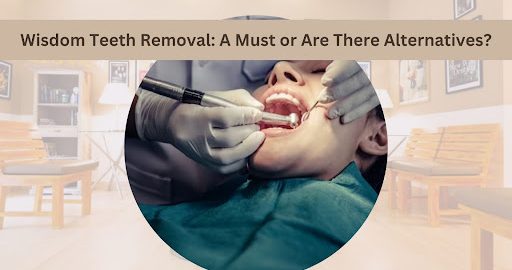
Wisdom Teeth Removal: Is it Always Necessary, or Are There Alternatives?
Wisdom teeth are the last set of molars, and they usually start to erupt in the late teens or early twenties. Like all other parts of the human body, for most people, there will be no problem at all with their third molars; however, many others are going to have trouble, sometimes severe enough to need extraction. This paper aims to discuss indications for the removal of wisdom teeth, other management that can be offered for the likely problems, and considerations in making an informed decision.
Role of Wisdom Teeth
The necessity to remove the wisdom teeth has to be perceived against what these used to do in our ancestors. The diet of our forefathers was tough and not easy to chew, therefore, wearing away their teeth pretty considerably. Wisdom teeth erupted late in life to take over worn-out older teeth. However, with advancement of diet, easy to chew, and dental care led to loss of the need for wisdom teeth.
Common Problems with Wisdom Teeth
Wisdom teeth do not cause problems or misalignment of the existing dentition for most individuals. Well, not for everybody, though. There are many common problems with wisdom teeth and among them include:
- Impaction: There was not enough space inside the cavity to accommodate the wisdom tooth completely. This more often presents with a kind of impacted or partially erupted form of a wisdom tooth, causing pain, swelling and infection.
- Crowding: There is usually crowding of adjacent teeth due to impacted wisdom teeth that may lead to malalignment or crowding.
- Gum Infection: When part of the wisdom tooth is erupted, there may be an opening for bacterial invasion into the gum, causing a localized gum infection and inflammation known as pericoronitis.
- Cysts and Tumors: Less frequently, impacted wisdom teeth cause formation of cysts or tumors by the surrounding tissues of the impacted wisdom teeth which can damage the adjacent bone and tissues..
When Is the Extraction of Wisdom Teeth Indicated?
Not all wisdom teeth have to be removed. However, there are some facts that will be taken by dentists and oral surgeons before suggesting extraction:
- There are cases where fully impacted wisdom teeth are usually subject to removal because they can give pain, swelling, and recurrent infections.
- There could be partially erupted wisdom teeth, which easily infect the gums and lead to other oral health issues while being hard to clean accordingly.
- Crowding: When there is pressure from the wisdom teeth on other teeth, crowding and misalignment begin, and extraction may then be necessary to maintain a general oral health.
- Degeneration and Damage: If they are diseased, damaged, or causing damage to the surrounding other teeth or tissues, extraction would generally be the only option
Choices Besides Wisdom Tooth Extraction
- Extraction would still remain one of the many popular alternatives, but, according to various situations, the following alternative procedures could also be employed.
- Monitoring: If the wisdom teeth do not pose a serious issue, a dentist can refer for regular monitoring with the help of periodical X-rays to track the progress.
- Medications: Medications like over-the-counter pain relievers and antibiotics may be prescribed for short periods in order to relieve the pain and inflammation brought by the erupting wisdom teeth.
- Orthodontic Treatment: In other instances, orthodontic treatment may be required to make sufficient space in the mouth to counter the crowding effect caused by the presence of the wisdom teeth.
- The wise teeth may be removed in stages if they are quite a number and extracted stage by stage to reduce pain and hasten recovery.
Making an Informed Decision
There are a few factors that you need to consider when you decide to either have your wisdom teeth out or to use some other method for the removal process.
- Professional Consultation: A registered dentist or oral surgeon should come to an assessment of the wisdom teeth to discuss risk factors and possible benefits.
- General Oral Health: Know how the existence of the wisdom teeth in general affects oral health, risks of infection, the way the dental teeth line up, and damage to the neighborly teeth.
- Age and Recovery: he young heal faster. This is mostly a determining factor for time.
- Comfort with the dental procedure and personal preference can be factored in.
In some cases, removal of wisdom teeth is not necessary because there are alternatives depending on the situation of the individual. A proper assessment by the dental professional will make this decision much better informed. Whether extraction, monitoring, or any other alternative occurs, oral health will create a bright smile and provide a comfortable future.
Leave a Reply
Leave a Reply
Explore More Similar Posts
Explore More Blogs


Leave a Reply